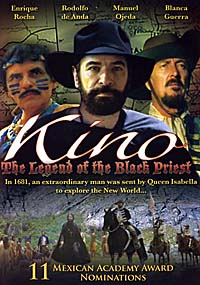
Kino: La leyenda del padre negro
Kino: The legend of the black father
Tipo de producción/Type of Production
Largometraje/Feature
Año de producción/Production Year
1992
País/Country
México
Duración/Running time
105 min.
Producción/Production
Dirección/Director
Felipe Cazals
Producción/Producer
Carlos Reséndiz
Guion/Screenplay
Gerardo de la Torre, Tomás Pérez Turrent, Felipe Cazals
Fotografía/Cinematography
Ángel Goded
Edición/Editing
Carlos Savage
Sonido/Sound
Daniel García Campos
Música/Music
Amparo Rubín
Dirección de arte/Art direction
Patricia Martín
Felipe Cazals
Producción/Producer
Carlos Reséndiz
Guion/Screenplay
Gerardo de la Torre, Tomás Pérez Turrent, Felipe Cazals
Fotografía/Cinematography
Ángel Goded
Edición/Editing
Carlos Savage
Sonido/Sound
Daniel García Campos
Música/Music
Amparo Rubín
Dirección de arte/Art direction
Patricia Martín
Sinopsis/Synopsis
Kino es la crónica de la vida de un hombre que vivió las contradicciones y circunstancias de su tiempo. Quería servir a Dios y al rey y terminó viviendo con pasión y riesgo la actividad científica. Eusebio Francisco Kino, misionero y colonizador jesuita, fue, además, cartógrafo y cosmógrafo real; lo llamaron el Padre Negro a Caballo en la Pimeria Alta de Sonora y Arizona y es en la Alta y Baja California una leyenda desde 1681.
Kino is the chronicle of a man whose life encapsulated the circumstances and the contradictios of his time. He aimed to serve God and the King, and ended up dedicating himself to scientific activity with passion and all the riks that this implied. Eusebio Francisco Kino, missionary and Jesuit colonist, was also the royal cartographer and cosmographer; he was know as the Black Horse-riding Father in the Pimeria Alta of Sonora and Arizona and from 1681 on, became a legend in Ipper and Lower California.
Kino is the chronicle of a man whose life encapsulated the circumstances and the contradictios of his time. He aimed to serve God and the King, and ended up dedicating himself to scientific activity with passion and all the riks that this implied. Eusebio Francisco Kino, missionary and Jesuit colonist, was also the royal cartographer and cosmographer; he was know as the Black Horse-riding Father in the Pimeria Alta of Sonora and Arizona and from 1681 on, became a legend in Ipper and Lower California.
Compañías productoras/Production companies
IMCINE, Cine Eclipse, S. A. de C.V., Fondo de Fomento a la Calidad Cinematográfica, Gobierno del Estado de Sonora, RTC, Secretaría de Gobernación
Formato/Format
35 mm
Reparto/Cast
Enrique Rocha, Rodolfo de Anda, Carlos Cardan, Leonardo Daniel, Fernando Balzaretti, Jorge Fegan, Ignacio Guadalupe, Adyari Cházaro, Manuel Ojeda, Aarón Hernán
Locación/Location
Sonora, Ciudad de México (México)
Idioma/Language
Español
Premios/Awards
·Mejor Música de Fondo (Amparo Rubín) de la XXXVI Entrega de los Arieles de la Academia Mexicana de Artes y Ciencias Cinematográficas, México, 1994
Contacto/Contact
Instituto Mexicano de Cinematografía
Atletas 2, edificio Luis Buñuel, piso 4
Col. Country Club
CP 04210, Coyoacán, Ciudad de México
Tels.: Tels.: (52) 55 54 48 53 39, 55 54 48 53 47
festivals@imcine.gob.mx
Enlace a página 1
Atletas 2, edificio Luis Buñuel, piso 4
Col. Country Club
CP 04210, Coyoacán, Ciudad de México
Tels.: Tels.: (52) 55 54 48 53 39, 55 54 48 53 47
festivals@imcine.gob.mx
Enlace a página 1
¿Detectaste algún error en este registro?
Fecha de última modificación: 7 de febrero del 2023, 3:54
Información proporcionada por:
Red Nacional de Información Cultural
Instituto Mexicano de Cinematografía
u-cm
Información proporcionada por:
Red Nacional de Información Cultural
Instituto Mexicano de Cinematografía
u-cm
